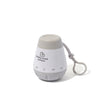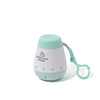Nap Refusals 101: When to Push and When to Let It Go
Nap refusal—it’s one of the most confusing, frustrating stages for parents, and let’s be honest, it can feel like a personal attack. You’ve followed the routine, made sure the sleep environment is just right, and yet, your baby or toddler flat-out refuses to nap. What gives?
Before you start questioning all your sleep strategies, know this: nap refusal is completely normal and it happens to everyone at some point. But figuring out whether to push through or let it go is where it gets tricky. Don’t worry—we’ve got you covered with a guide to help you navigate this nap-time dilemma.
Why Naps Get Refused: First things first, let’s talk about the “why.” There are plenty of reasons a baby or toddler might suddenly turn their nose up at nap time. Here are some common culprits:
Nap Transitions: If your little one is transitioning between nap stages (like from 3 naps to 2 or 2 naps to 1), this is a big adjustment that often leads to nap refusal. They might not quite be ready for fewer naps, but they also don’t need as much sleep during the day anymore. These transitions are messy and can cause a lot of stress for both you and your child.
Too much or too little wake time: This is a big one. If your baby or toddler has been awake too long, they may be overtired, which makes it harder to fall asleep. On the other hand, if they haven’t been awake long enough, they might not be tired enough for a nap. Getting the wake window just right is key!
Developmental leaps and new milestones: Ah, the dreaded developmental leap. Your baby or toddler is constantly growing and learning new things, and this often interferes with their ability to nap. From rolling over to crawling or even talking, new milestones can make naps seem unimportant compared to all the new skills they’re mastering.
Overstimulation or not enough wind-down time: It’s easy to forget just how stimulating the world around them can be. Too much activity before nap time or not enough time to calm down can make it nearly impossible for them to settle down. Babies and toddlers thrive on predictability, and if they’re overstimulated, even a routine nap might feel overwhelming.
When to Push: Sometimes nap refusal isn’t a sign that your baby is ready to drop a nap, but rather that they need a little extra help getting into sleep mode. So when do you keep trying? Here’s when you should push for that nap:
When your baby is showing sleepy cues but resisting sleep: You know your baby best. If you’re seeing signs that they’re tired (like rubbing eyes, yawning, or getting fussy) but they’re just fighting it, it may be worth trying a bit longer to help them settle down. Try giving them a longer wind-down routine or offer soothing methods like rocking or soft music.


